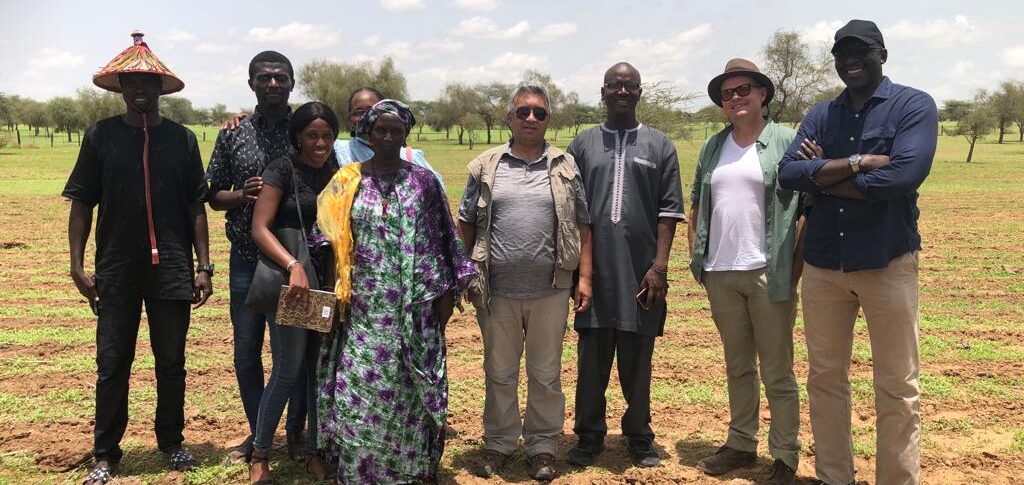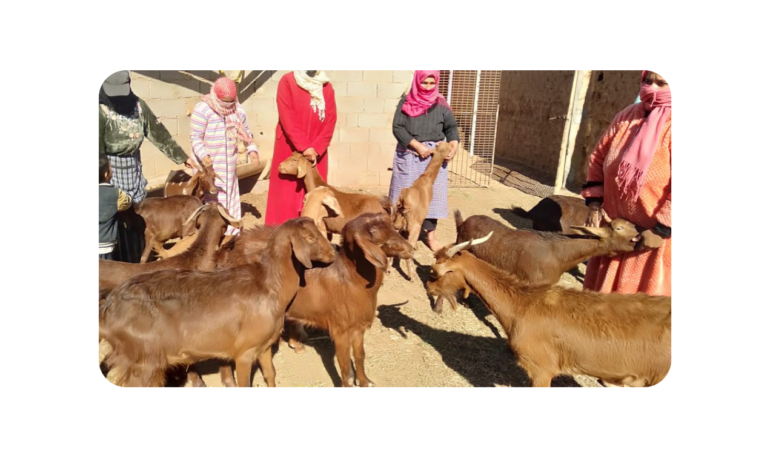
Enhancing the Resilience of Smallholder Farms in North and West Africa through Upgrading of Women Managed Dairy Value Chains (DAIRY-SHCS-01)

Theme: Climate & Weather-Smart Plant Nutrition
Project Lead

African Plant Nutrition Institute
Supported by

Implementing Partners

R&D Maroc (Morocco)

IED Afrique (Senegal)
Target Cropping Systems
Mixed Cereal-Legume-Forage Livestock Systems
Target Countries
Morocco, Senegal
Other Targets
Cow and goat dairy farmers, especially women, in Senegal and Morocco, respectively.
Short Description
The project addresses the problem of vulnerability of family farms in Morocco and Senegal to global and local forces of climate change, land degradation, economic power imbalance, market shocks, and the exclusion of rural women from participating in the development of more resilient local solutions to these problems. We propose to change this situation by enhancing the resilience, the quality and the sustainability of local food systems, especially milk production and processing systems.
This work was carried out with the aid of a grant from the International Development Research Centre, Ottawa, Canada, supported by the African Plant Nutrition Institute.
The project addresses the problem of vulnerability of family farms in Morocco and Senegal to global and local forces of climate change, land degradation, economic power imbalance, market shocks, and the exclusion of rural women from participating in the development of more resilient local solutions to these problems. We propose to change this situation by enhancing the resilience, the quality and the sustainability of local food systems, especially milk production and processing systems.
Locally grounded milk value chains are chosen for their potential to address a mix of internal and external challenges including gender inclusivity, income instability, climate variability, land degradation, out-migration and marginalization in rural areas, and reduced dependence on imports of dairy products. In both countries, milk production – from goats in Morocco and cows in Senegal – is promising, but the conversion from animal farms to dairy farms remains demanding. The issues call for a value chain (VC) approach to link gains from forage/pasture management through milk production to trading/processing. Technical solutions are required for the modernization of the VC, but they need to be embedded in a VC approach that creates and distributes value to the women who are key actors in these chains.
This project will test the hypothesis that upgrading of existing milk value chains in Morocco and in Senegal with a stronger engagement of women in their governance and management will enhance the resilience of farming families to internal and external shocks, will increase their income, and will improve their food security and nutrition. We consider inclusion of women vital to realize opportunities to upgrade value chains rapidly and to confer locally-appropriate design – vital for resilience to external shocks. Within the lifetime of this project we will evaluate this hypothesis through a proof-of-concept (PoC)/prototype (PT) approach that structures change around clearly articulated business models (BMs), that explain the details of innovation and identify the options for scaling up of interventions in a following pilot project.
The project supports the development of goat and cow milk value chains in Morocco and Senegal, respectively, by deploying a process that consists of three key components:
- Diagnostic of local dairy value chains,
- Farmer-centric change,
- Business model development.
In order to implement the overall process, research will be guided by five broad research questions:
- The first concerns the value chains: Specifically, how will changes strengthen the livelihoods of small holder farmers and empower women in the value chains, by increasing the performance of production systems, reinforcing the local institutions and local markets?
- The second concerns the inclusiveness of change. What challenges or opportunities do these disruptions present for the women who work in these local value chains?
- The third is about farmer innovation, and specifically how farmer-centric experimentation can empower women to drive development through technical interventions they consider appropriate and promising?
- The fourth is about organizing change. How can business model design secure the growth of multiple revenue streams from such interventions to upgrade existing local value chains?
- The fifth is how upgrading of the milk value chain is expected to enhance resilience to internal shocks as well as to external shocks such as climate change and COVID-19?
The supporting research therefore needs to close knowledge gaps that relate to:
- Understanding specific processes and enabling factors that underlie the governance, coordination and performance of local dairy value chains in Morocco and Senegal, and how these processes and factors affect the inclusion of women into chain governance and the benefits they may generate from participation in these chains. We anticipate new insights into the social dimension that underpins gender specific upgrading of value chains.
- Understanding processes and requirements that need to be in place for farmers, and especially so women, to become the drivers and co-owners of and partners in value chain innovation development.
- Generating and providing resources [credits, advice, inputs, seeds/varieties] by research and value chain agents that underpin such farmer inclusive knowledge and profit generation, and the dissemination of innovation for prosperous rural communities.
- Composing a portfolio of specific chain upgrading opportunities that systematically at controllable risks increase the benefits generated for women, including to understand at what extend non-conventional upgrading opportunities related to environmental service provision in the face of climate and weather variability can be included into such portfolio.
- Developing and accessing the specialist content knowledge that permits the successful development of specific dairy value chain interventions selected by the project partners in Morocco and Senegal.
- Setting up and maintaining a support incubator that facilitates cross regional learning between case projects.
A major goal of this project is to demonstrate science-supported solutions to farming systems improvement that can be applied to a range of related opportunities in regions elsewhere in Senegal and Morocco, and other African countries.
The generalized scientific challenge is to support activities to develop farmer-centric, value-chain growth within business models in ways which are understood in terms of agronomy, social science and business organization. The specific solutions in project areas in Morocco and Senegal support the development of an integrated crop-livestock system based on milk production in difficult environments in ways that address biological limitations but also engage the people who will implement them and build capital in order to make change sustainable. To achieve this, the project leverages three science contributions for solutions that are coordinated through one conceptual framework:
First, the value chain (VC) research identifies opportunities for increased activity in milk value chains in the two countries, considering uncertainties that range from climate seasonality, soil suitability, access to resources, skills availability, access to capitals and market. The output of this activity will be insights of current and prospective milk value chains, the prospects for change and the people and institutional requirements for this to occur.
Second, on-farm experimentation (OFE) will explore with women farmers and other farm organizations a range of technical options to address the value chain opportunities. The process of OFE ensures that options are explored in their practical context. Researchers will aid interpretation of the process in the scientific context of climate, soil or agronomic constraints to ensure that the result of OFE is co-learning amongst researchers and farmers, to underpin progressive, knowledge-based improvement of the systems.
The third contribution is the development of scalable solutions through business model development. Business model analysis will identify options for value creation and process for value sharing processes that ensure that growth is inclusive, namely that it improves the engagement and empowerment of all, and especially women farmers within their communities.
The main objective of the project is enabling farmer-centric knowledge generation aimed at enhancing resilience of smallholder farms in North and West Africa through gender specific upgrading of women managed milk value chains. We use innovative technologies to help stimulate, grow, stabilize and promote local food systems that generate additional income – especially for women – to meet households’ needs of small-holder farmers. We will demonstrate the process in local dairy value chains in Morocco and Senegal.
Our overall process consists of three key components:
- Local Value Chain diagnostic and upgrading,
- Farmer-Centric Change to ensure there are the owners of innovation, and
- Business Model Development to scale success out.
In Morocco the VC will focus on goats’ milk, in Senegal, on cow’s milk. We envision that both chains will empower rural women as we see their skills in financial and quality-oriented product management to be critical.
Specific objectives comprise:
- Set up an incubator to (a) support innovation systems that will upgrade VCs operated by women in focus areas in Morocco and Senegal; and (b) establish an ad-hoc learning network to help scale VCs regionally.The incubator guides development processes and research results. It communicates findings amongst local implementing partners through cross-learning to strengthen VC development locally. The ad-hoc learning network underpins this process, and develops scaling concepts and business models design.
- Execute VC diagnostics through a structured assessment of knowledge, processes, mechanisms and products in dairy production and marketing systems. The diagnostics will evaluate the effect of institutional, market and agricultural factors which mediate the potential for VCs to upgrade. In this way, they will provide the knowledge to (a) identify upgrading and market development opportunities that specifically benefit women, and (b) set up farmer-centric experimentation to trial new technical interventions they consider promising.
- Develop proofs of concept (PoC)/prototype (PT) with one or two communities in each country from which to outline market development strategies to scale up local dairy value chains. The ad-hoc learning network will review these to identify options to scale to pilot and implementation phases. The PoC includes the development of gender specific business models that will secure income streams for farming families.
Objectives 1 and 2 generate the responses to the first two research questions. This will include the effects of the COVID-19 pandemic. Key activities include the diagnosis of the current situation within the milk value chains in in the target regions in Morocco and Senegal and particularly the role of women. The principle outputs include fully mapped value chains in each case study region, and the identification of a portfolio of upgrading opportunities, available support systems and timeframes for upgrading. Secondly, based on the diagnostics, up to two farming communities are identified in each region for the development of interventions, and relevant and locally most promising gender specific upgrading opportunities are selected from the portfolio of options with the communities. Taken together, this provides for a gender specific, market opportunity assessment, that establishes the platform on which responses are sought to the next set of research questions.
Objectives 1 and 3 generate the responses to the research questions 3 to 5. Key activities include establishing a farmer-centric OFE approach to generate relevant, credible and legitimate options to upgrade the existing dairy value chain. These will be evaluated within business models that understand the context of small-scale producers and institutional structures that operate around them. Testing the viability, acceptance and the potential of the experimentation approach and business models in one or two communities in each country is done as pre-requisite for scaling up to a pilot initiative in a subsequent project. The principle outputs include trialing of upgrading interventions, developing of relevant business models, and the engagement of policy makers and industry (farmers, processors, retailers), which will provide a platform for market and agro-enterprise development.
- Understand the dairy value chains linked to goat production in Morocco, and cattle production in Senegal.
- Elucidate the inclusiveness of change.
- Understand the business model.
- Understand farmer innovation.

